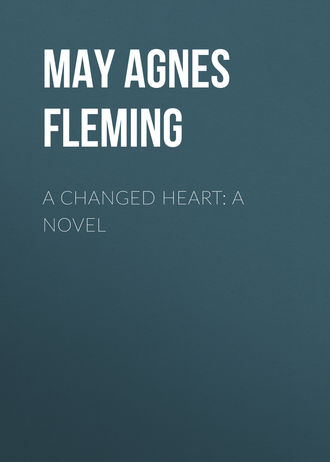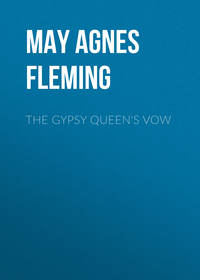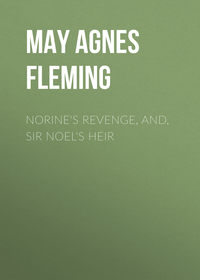 полная версия
полная версияA Changed Heart: A Novel
The young lady laughed.
"Oh, everybody likes Val! Have you known him long?"
"About a year. I have seen him in Halifax frequently, and we are the greatest friends, I assure you. Damon and Pythias were nothing to us!"
"It is something new for Mr. Blake to be so enthusiastic, then. Pythias is a new rôle for him. I hope he played it better than he did Robert Bruce in that horrid tableau awhile ago."
They both laughed at the recollection. Natty scented her rose.
"Some one threw me this. Gallant, wasn't it? I love roses."
"Sweets to the sweet! I am only sorry I had not something more worthy 'Evangeline,' than that poor little flower."
"Then it was you. I thought so! Thank you for the rose and the compliment. One is as pretty as the other."
She laughed saucily, her bright eyes flashing a dangerous glance at him. Next instant they were floating round, and round, and round; and Captain Cavendish began to think the world must be a great rose garden, and Speckport Eden, since in it he had found his Eve. Not quite his yet, though, for the moment the waltz concluded, a dashing and dangerously good-looking young fellow stepped coolly up and bore her off.
Val having given his partner a finishing whirl into a seat, left her there, and came up, wiping his face.
"By jingo, 'tis hard work, and Catty Clowrie goes the pace with a vengeance. How do you like Natty?"
"'Like' is not the word. Who is that gentleman she is walking with?"
"That – where are they? Oh, I see – that is Captain Locksley, of the merchant-service. The army and navy forever, eh! Where are you going?"
"Out of this hot room a moment. I'll be back directly."
Mrs. McGregor came up and asked Val to join a whist-party she was getting up. "And be my partner, Val," she enjoined, as she led him off, "because you're the best cheat I know of."
Val was soon completely absorbed in the fascinations of whist, at a penny a game, but the announcement of supper soon broke up both card-playing and dancing; and as he rose from the table he caught sight of Captain Cavendish just entering. His long legs crossed the room in three strides.
"You've got back, have you? What have you been about all this time?"
"I was smoking a cigar out there on the steps, and getting a little fresh air – no, fog, for I'll take my oath it's thick enough to be cut with a knife. When I was in London, I thought I knew something of fog, but Speckport beats it all to nothing."
"Yes," said Val, gravely, "it's one of the institutions of the country, and we're proud of it. Did you see Charley Marsh anywhere in your travels. I heard Natty just now asking for him."
"Oh, yes, I've seen him," said Captain Cavendish, significantly.
There was that in his tone which made Val look at him. "Where was he and what was he doing?" he inquired.
"Making love, to your first question; sitting in a recess of the tall window, to your second. He did not see me, but I saw him."
"Who was he with?"
"Something very pretty – prettier than anything in this room, excepting Miss Natty. Black eyes, black curls, rosy cheeks, and the dearest little waist! Who is she?"
Val gave a long, low whistle.
"Do you know her?" persisted Captain Cavendish.
"Oh, don't I though? Was she little, and was she laughing?"
"Yes, to both questions. Now, who is she?"
Val's answer was a shower of mysterious nods.
"I heard the story before, but I didn't think the boy was such a fool. Speckport is such a place for gossip, you know; but it seems the gossips were right for once. What will Natty say, I wonder?"
"Will you tell me who she is?" cried Captain Cavendish, impatiently.
"Come to supper," was Val's answer; "I'm too hungry to talk now. I'll tell you about it by-and-by."
Charley was before them at the table, helping all the young ladies right and left, and keeping up a running fire of jokes, old and new, stale and original, and setting the table in a roar. Everybody was talking and laughing at the top of their lungs; glass and china, and knives and forks, rattled and jingled until the uproar became deafening, and people shouted with laughter, without in the least knowing what they were laughing at. The mustached lip of Captain Cavendish curled with a little contemptuous smile at the whole thing, and Miss Jeannette McGregor, who had managed to get him beside her, saw it, and felt fit to die with mortification.
"What a dreadful noise they do keep up. It makes my head ache to listen to them!" she said, resentfully.
Captain Cavendish, who had been listening to her tattle-tittle for the last half-hour, answering yes and no at random, started into consciousness that she was talking again.
"I beg your pardon, Miss McGregor. What was it you said? I am afraid I was not attending."
"I am afraid you were not," said Miss McGregor, forcing a laugh, while biting her lips. "They are going back to the drawing-room —Dieu merci! It is like Babel being here."
"Let us wait," said Captain Cavendish, eying the crowd, and beginning to be gallant. "I am not going to have you jostled to death. One would think it was for life or death they were pushing."
It was fully ten minutes before the coast was clear, and then the captain drew Miss Jeannette's arm within his, and led her to the drawing-room. Mrs. McGregor, sitting there among her satellites, saw them, and the maternal bosom glowed with pride. It was the future Marquis and Marchioness of Carrabas!
Some one was singing. A splendid soprano voice was ringing through the room, singing, "Hear me, Norma." It finished as they drew near, and the singer, Miss Natty Marsh, glancing over her shoulder, flashed one of her bright bewitching glances at them.
She rose up from the piano, flirting out her gauze skirts, and laughing at the shower of entreaties to sing again.
"I am going to see some engravings Alick has promised to show me," she said; "so spare your eloquence, Mesdames et Messieurs. I am inexorable."
"I think I will go over and have a look at the engravings, too," said Captain Cavendish.
She was sitting at a little stand, all her bright hair loose around her, and shading the pictures. Young McGregor was bending devoutly near her, but not talking, only too happy to be just there, and talking was not the young gentleman's forte.
"Captain Cavendish," said the clear voice, as, without turning round, she held the engraving over her shoulder, "look at this – is it not pretty?"
How had she seen him? Had she eyes in the back of her head? He took the engraving, wondering inwardly, and sat down beside her.
It was a strange picture she had given him. A black and wrathful sky, a black and heaving sea, and a long strip of black and desolate coast. A full moon flickered ghastly through the scudding clouds, and wan in its light you saw a girl standing on a high rock, straining her eyes out to sea. Her hair and dress fluttered in the wind; her face was wild, spectral, and agonized. Captain Cavendish gazed on it as if fascinated.
"What a story it tells!" Nathalie cried. "It makes one think of Charles Kingsley's weird song of the 'Three Fishers.' Well, Charley, what is it?"
"It is the carryall from Redmon come for you," said Charley, who had sauntered up. "If you are done looking at the pictures you had better go home."
Natty pushed the portfolio away pettishly, and rose, half-poutingly.
"What a nuisance, to go so soon!"
Then, catching Captain Cavendish's eye, she laughed good-naturedly.
"What can't be cured – you know the proverb, Captain Cavendish. Charley, wait for me in the hall, I will be there directly."
She crossed the room with the airy elegance peculiar to her light swinging tread, made her adieux quietly to the hostess, and sought her wrappings and the dressing-room.
As she ran down into the hall in a large shawl, gracefully worn, and a white cloud round her pretty face, she found Captain Cavendish waiting with Charley. It was he who offered her his arm, and Charley ran down the steps before them. Through the wet fog they saw an old-fashioned two-seated buggy waiting, and the driver looking impatiently down.
"I wish you would drive up with me, Charley," said Natty, settling herself in her seat.
"Can't," said Charley. "I am going to see somebody else's sister home. I'll take a run up to-morrow evening."
"Miss Marsh," Captain Cavendish lazily began, "if you will permit me to – " but Natty cut him short with a gay laugh.
"And make all the young ladies in there miserable for the rest of the evening! No, thank you! I am not quite so heartless. Good night!"
She leaned forward to say it, the next moment she was lost in the fog. He caught one glimpse of a white hand waved, of the half-saucy, half-wicked, wholly-bewitching smile, of the dancing blue eyes and golden hair, and then there was nothing but a pale blank of mist and wet, and Charley was speaking:
"Hang the fog! it goes through one like a knife! Come along in, captain, they are going to dance."
Captain Cavendish went in, but not to dance. He had come from curiosity to see what the Speckportonians were like, not intending to remain over an hour or so. Now that Natty was gone, there was no inducement to stay. He sought out Mrs. McGregor, to say good-night.
"What's your hurry?" said Val, following him out.
"It is growing late, and I am ashamed to say I am sleepy. Will you be in the office to-morrow morning?"
"From eight till two," said Val.
"Then I'll drop in. Good night!"
The cathedral clock struck three as he came out into the drizzly morning, and all the other clocks in the town took it up. The streets were empty, as he walked rapidly to his lodgings, with buttoned-up overcoat, and hat drawn over his eyes. But a "dancing shape, an image gay" were with him, flashing on him through the fog; hunting him all the way home, through the smur and mist of the dismal day-dawn.
CHAPTER III.
MISS ROSE
Eight was striking by every clock in the town, as down Queen Street – the Broadway of Speckport – a tall female streamed, with a step that rang and resounded on the wooden pavement. The tall female, nodding to her acquaintances right and left, and holding up her bombazine skirts out of the slop, was Miss Jo Blake, as bright as a new penny, though she had not had a wink of sleep the night before. Early as the hour was, Miss Jo was going to make a morning call, and strode on through the fog with her head up, and a nod for nearly every one she passed.
Down Queen Street Miss Jo turned to the left, and kept straight on, facing the bay, all blurred and misty, so that you could hardly tell where the fog ended and the sun began. The business part of the town, with its noise and rattle and bustle, was left half a mile behind, and Miss Jo turned into a pretty and quiet street, right down on the sea-shore. It was called Cottage Street, very appropriately, too; for all the houses in it were cozy little cottages, a story and a half high, all as much alike as if turned out of a mold. They were all painted white, had a red door in the center, and two windows on either side of the door, decorated with green shutters. They had little grass-plots and flower-beds in front, with white palings, and white gate, and a little graveled path, and behind they had vegetable-yards sloping right down to the very water. If you leaned over the fences at the lower end of these gardens, on a stormy day, and at high tide, you could feel the salt spray dashing up in your face, from the waves below. At low water, there was a long, smooth, sandy beach, delightful to walk over on hot summer days.
Before one of the cottages Miss Jo drew rein, and rapped. While waiting for the door to open, the flutter of a skirt in the back garden caught her eye; and, peering round the corner of the house, she had a full view of it and its wearer.
And Miss Jo set herself to contemplate the view with keenest interest. To see the wearer of that fluttering skirt it was that had brought Miss Jo all the way from her own home so early in the morning, though she had never set eyes on her before.
Uncommonly friendly, perhaps you are thinking. Not at all: Miss Jo was a woman, consequently curious; and curiosity, not kindness, had brought her out.
The sight was very well worth looking at. You might have gazed for a week, steadily, and not grown tired of the prospect. A figure, slender and small, wearing a black dress, white linen cuffs at the wrists, a white linen collar, fastened with a knot of crape, a profusion of pretty brown hair, worn in braids, and low in the neck, hands like a child's, small and white. She was leaning against a tree, a gnarled old rowan tree, with her face turned sea-ward, watching the fishing-boats gliding in and out through the fog; but presently, at some noise in the street, she glanced around, and Miss Jo saw her face. A small, pale face, very pale, with pretty features, and lit with large, soft eyes. A face that was a history, could Miss Jo have read it; pale and patient, gentle and sweet, and in the brown eye a look of settled melancholy. This young lady in black had been learning the great lesson of life, that most of us poor mortals must learn, sooner or later, endurance – the lesson One too sublime to name came on earth to teach.
Miss Jo dodged back, the door swung open, and a fat girl, bursting out of her hooks and eyes, and with a head like a tow mop, opened the door. Miss Jo strode in without ceremony.
"Good morning, Betsy Ann! Is Mrs. Marsh at home this morning?"
"Yes, Miss Jo," said Betsy Ann, opening a door to the left, for there was a door on either hand; that to the right, leading to the drawing-room of the cottage, and a staircase at the end leading to the sleeping-room above; the door to the left admitted you to the sitting-room and dining-room, for it was both in one – a pleasant little room enough, with a red and green ingrain carpet, cane-seated chairs, red moreen window-curtains on the two windows, one looking on the bay, the other on the street. There was a little upright piano in one corner, a lounge in another; pictures on the papered walls; a Dutch clock and some china cats and dogs and shepherdesses on the mantel-piece; a coal-fire in the Franklin, and a table laid for breakfast.
The room had but one occupant, a faded and feeble-looking woman, who sat in a low rocking-chair, her feet crossed on the fender, a shawl around her, and a book in her hand. She looked up in her surprise at her early visitor.
"Law! Miss Blake, is it you? Who'd have thought it? Betsy Ann, give Miss Blake a chair."
"It's quite a piece from our house here, and I feel kind of tired," said Miss Jo, seating herself. "Your fire feels comfortable, Mrs. Marsh; these foggy days are chilly. Ain't you had breakfast yet?"
"It's all Charley's fault; he hasn't come down stairs yet. How did you enjoy yourself at the party last night?"
"First-rate. Never went home till six this morning, and then I had to turn to and make Val his breakfast. Charley left early."
"Early!" retorted Mrs. Marsh; "I don't know what you call early. It was after six when he came here, Betsy Ann says."
"Well, that's odd," said Miss Jo. "He left McGregor's about half past three, anyway. Did you hear they had an officer there last night?"
"An officer! No. Who is it?"
"His name is Captain Cavendish, and a beautiful man he is, with a diamond ring on his finger, my dear, and the look of a real gentleman. His folks are very great in England. His brother's the Marquis of Cabbage – Carraways – no, I forget it; but Val knows all about him."
"Law!" exclaimed Mrs. Marsh, opening her light-blue eyes, "a Marquis! Who brought him?"
"Val did. Val knows every one, I believe, and got acquainted with him in Halifax. You never saw any one so proud as Mr. McGregor. I didn't say anything, my dear; but I thought of the time when lords and marquises, and dukes and captains without end, used to be entertained at Castle Blake," said Miss Jo, sighing.
"And what does he look like? Is he handsome?" asked Mrs. Marsh, with interest; for Castle Blake and its melancholy reminiscences were an old story to her.
"Uncommon," said Miss Jo; "and I believe Mrs. McGregor thinks her Jane will get him. You never saw any one so tickled in your life. Why weren't you up? – I expected you."
"I couldn't go. Miss Rose came just as I was getting ready, and of course I had to stay with her."
"Oh, the new teacher! I saw a young woman in black standing in the background as I came in; was that her?" said Miss Jo, who did not always choose to be confined to the rules of severe grammar.
"Yes," said Mrs. Marsh; "and what do you think, Miss Blake, if she wasn't up this morning before six o'clock? Betsy Ann always rises at six, and when she was rolling up the blind Miss Rose came down-stairs already dressed, and has been out in the garden ever since. Betsy Ann says she was weeding the flowers most of the time."
"She's a little thing, isn't she?" said Miss Jo; "and so delicate-looking! I don't believe she'll ever be able to manage them big rough girls in the school. What's her other name besides Miss Rose?"
"I don't know. She looks as if she had seen trouble," said Mrs. Marsh, pensively.
"Who is she in mourning for?"
"I don't know. I didn't like to ask, and she doesn't talk much herself."
"Where did she come from? Montreal, wasn't it?"
"I forget. Natty knows. Natty was here last night before she went up to McGregor's. She said she would come back this morning, and go with Miss Rose to the school. Here's Charley at last." Miss Jo faced round, and confronted that young gentleman sauntering in.
"Well, Sleeping Beauty, you've got up now, have you?" was her salute. "How do you feel after all you danced last night?"
"Never better. You're out betimes this morning, Miss Jo."
"Yes," said Miss Jo; "the sun don't catch me simmering in bed like it does some folks. Did it take you from half-past three till six to get home this morning, Mr. Charles?"
"Who says it was six?" said Charley.
"Betsy Ann does," replied his mother. "Where were you all the time?"
"Betsy Ann's eyes were a couple of hours too fast. I say, mother, is the breakfast ready? It's nearly time I was off."
"It's been ready this half-hour. Betsy Ann!"
That maiden appeared.
"Go and ask Miss Rose to please come in to breakfast, and then fetch the coffee."
Betsy Ann fled off, and Charley glanced out of the window.
"Miss Rose is taking a constitutional, is she? What is she like, mother – pretty? I didn't see her last night, you know."
"What odds is it to you?" demanded Miss Jo; "she's not as pretty as Cherrie Nettleby, anyhow."
Charley turned scarlet, and Miss Jo's eyes twinkled at the success of her random shaft. The door opened at that instant, and the small, slender black figure glided in. Glided was the word for that swift, light motion, so noiseless and fleet.
"Good morning," said Mrs. Marsh, rising smiling to shake hands; "you are an early bird, I find. Miss Blake, Miss Rose – Miss Rose, my son Charles."
My son Charles and Miss Blake both shook hands with the new teacher, and welcomed her to Speckport. A faint smile, a shy fluttering color coming and going in her delicate cheeks, and a few low-murmured words, and then Miss Rose sat down on the chair Charley had placed for her, her pretty eyes fixed on the coals, her small childlike hands fluttering still one over the other. Betsy Ann came in with the coffee-pot and rolls and eggs, and Mrs. Marsh invited Miss Jo to sit over and have some breakfast.
"I don't care if I do," said Miss Jo, untying her bonnet promptly. "I didn't feel like taking anything when Val had his this morning, and your coffee smells good. Are you fond of coffee, Miss Rose?"
Miss Rose smiled a little as they all took their places.
"Yes, I like it very well."
"Some folks like tea best," said Miss Jo, pensively, stirring in a third teaspoonful of sugar in her cup, "but I don't. What sort of a journey had you, Miss Rose?"
"Very pleasant, indeed."
"You arrived yesterday?"
Miss Rose assented.
"Was it from Halifax you came?"
"No, ma'am; from Montreal."
"Oh, from Montreal! You were born in Montreal, I suppose?"
"No, I was born in New York."
"Law!" cried Mrs. Marsh, "then, you're a Yankee, Miss Rose?"
"Do your folks live in Montreal, Miss Rose?" recommenced the persevering Miss Jo.
The faint, rosy light flickered and faded again in the face of Miss Rose.
"I have no relatives," she said, without lifting her eyes.
"None at all! Father, nor mother, nor brothers, nor sisters, nor nothing."
"I have none at all."
"Dear me, that's a pity! Who are you in black for?"
There was a pause – then Miss Rose answered, still without looking up:
"For my father."
"Oh, for your father! Has he been long dead? Another cup, if you please. Betsy Ann knows how to make nice coffee."
"He has been dead ten months," said Miss Rose, a flash of intolerable pain dyeing her pale cheeks at this questioning.
"How do you think you'll like Speckport?" went on the dauntless Miss Jo. "It's not equal to Montreal or New York, they tell me, but the Bluenoses think there's no place like it. Poor things! if they once saw Dublin, it's little they'd think of such a place as this is."
"Halte là!" cried Charley; "please to remember, Miss Jo, I am a native, to the manner born, an out-and-out Bluenose, and will stand no nonsense about Speckport! There's no place like it. See Speckport and die! Mother, I'll trouble you for some of that toast."
"Won't you have some, Miss Rose?" said Mrs. Marsh. "You ain't eating anything."
"Not any more, thank you. I like Speckport very much, Miss Blake; all I have seen of it."
"That's right, Miss Rose!" exclaimed Charley; "say you like fog and all. Are you going to commence teaching to-day?"
"I should prefer commencing at once. Miss Marsh said she was coming this morning, did she not?" Miss Rose asked, lifting her shy brown eyes to Mrs. Marsh.
"Yes, dear. Charley, what time did Natty go home last night?"
"She didn't go home last night; it was half-past two this morning."
"Did she walk?"
"No; the old lady sent that wheelbarrow of hers after her."
"Wheelbarrow!" cried his mother, aghast. "Why, Charley, what do you mean?"
"It's the same thing," said Charley. "I'd as soon go in a wheelbarrow as that carryall. Such a shabby old rattle-trap! It's like nothing but the old dame herself."
"Charley, you ought to be ashamed of yourself. Did you go with her?"
"Not I! I was better engaged. Another gentleman offered his services, but she declined."
"Who was it? Captain Locksley?"
"No, another captain – Captain Cavendish."
"Did he want to go home with Natty?" asked Miss Jo, with interest. "I thought he was more attentive to her than to Jane McGregor! Why wouldn't she have him?"
"She would look fine having him – an utter stranger! If it had been Locksley, it would have been different. See here, Miss Rose," Charley cried, springing up in alarm, "what is the matter?"
"She is going to faint!" exclaimed Miss Jo, in consternation. "Charley, run for a glass of water."
Miss Rose had fallen suddenly back in her seat, her face growing so dreadfully white that they might well be startled. It was nothing for Miss Rose to look pale, only this was like the pallor of death. Charley made a rush for the water, and was back in a twinkling, holding it to her lips. She drank a portion, pushed it away, and sat up, trying to smile.
"I am afraid I have startled you," she said, as if necessary to apologize, "but I am not very strong, and – "
Her voice, faltering throughout, died entirely away; and, leaning her elbows on the table, she bowed her forehead on her hands. Miss Jo looked at her with compressed lips and prophetic eye.
"You'll never stand that school, Miss Rose, and I thought so from the first. Them girls would try a constitution of iron, let alone yours."
Miss Rose lifted her white face, and arose from the table.
"It is nothing," she said, faintly. "I do not often get weak, like this. Thank you!"
She had gone to the window, as if for air, and Charley had sprung forward and opened it.
"Does the air revive you, or shall I fetch you some more water?" inquired Charley, with a face full of concern.






